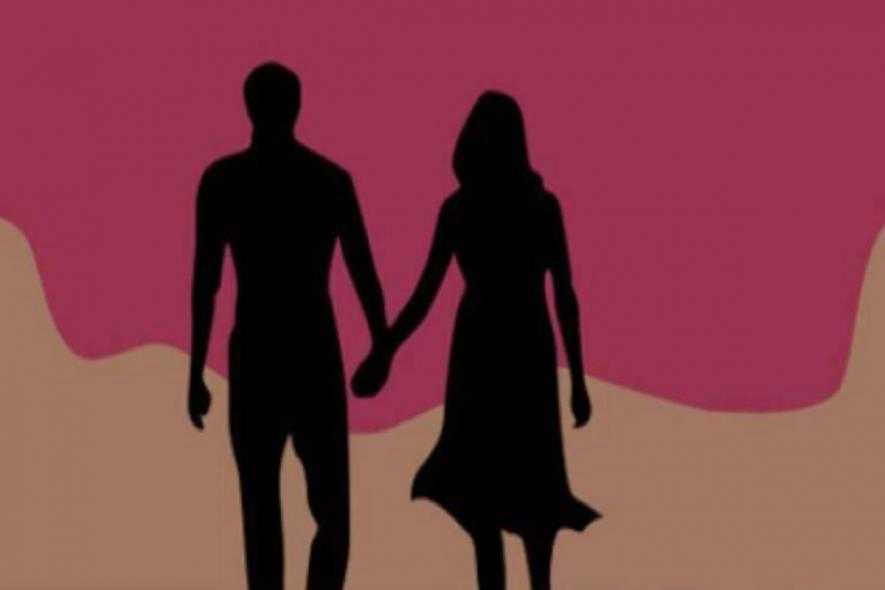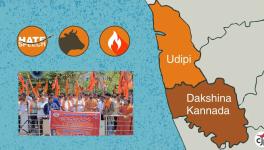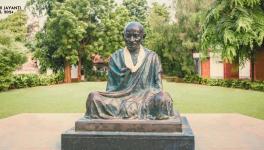Magistrate’s Approval not Required for Interfaith Marriage in Gujarat

Image Courtesy: The Leaflet
The Gujarat High Court’s (HC) stay on six provisions of the Gujarat Freedom of Religion (Amendment) Act, 2021, or the ‘anti-love jihad law’, on Thursday is a big relief to interfaith couples, who won’t require a magistrate’s approval for marriage for now.
The Division Bench of Chief Justice Vikram Nath and Justice Biren Vaishnah stayed Sections 3, 4, 4A, 4B, 4C, 5, 6 and 6A, which include the provision terming interfaith marriages as a means for forceful conversion.
The Bench was hearing two petitions challenging the constitutional validity of the Act filed by Minority Coordination Committee, a Gujarat-based minority rights organisation, and Jamiat Ulema-e Hind, an organisation of Islamic scholars belonging to the Deobandi school of thought.
Section 3, which deals with the prohibition on forcible conversion, states: “No person shall convert or attempt to convert, either directly or otherwise, any person from one religion to another by use of force or by allurement or by any fraudulent means or by marriage or by getting a person married or by aiding a person to get married nor shall any person abet such conversion”.
Section 4 prescribes imprisonment of up to four years for violation of Section 3, and Section 4A a maximum prison term of seven years for contravening provisions of Section 3 in case of marriage by unlawful conversion.
Section 4B defines “marriage by unlawful conversion” as “any marriage which is done for the purpose of unlawful conversion by the person of one religion with the person of another religion, either by converting himself/herself before or after marriage, shall be declared void by the Family Court or where the Family Court is not established, by the Court having jurisdiction to try such cases”.
Section 4C states offences by an institution or organisation being in breach of Section 3 and specifies punishment up to ten years of imprisonment. Sections 5 and 6 make it mandatory to take permission of the district magistrate in case of conversion and his/her permission to prosecute offences under the Act.
Noticeably, during the hearing on August 17, Attorney General (AG) Kamal Trivedi had stated that interfaith marriages are “per se not prohibited”. However, the Bench had observed that the language of the amended Act does not make the same clear, leaving a “sword hanging” on such marriages.
During Thursday’s hearing, AG Trivedi requested the Bench to clarify if the operation of the said Sections could be allowed if a marriage results in forced conversion. The Bench responded that its order had stated that interfaith marriages done without force, allurement or fraudulent means cannot be construed as an offence.
“We are, therefore, of the opinion that pending further hearing, the rigours of Sections 3, 4, 4A to 4C, 5, 6 and 6A, shall not operate merely because marriage is solemnised by person of one religion with another without force or allurement or fraudulent means and such marriages cannot be termed as marriages for the purpose of unlawful conversion,” Chief Justice Nath said.
“The above interim order is provided only on the lines of the arguments advanced by Mr Kamal Trivedi, learned advocate general, and to protect the parties solemnising the marriage (interfaith) from being unnecessarily harassed,” Justice Nath added.
The state government had passed the Gujarat Freedom of Religion (Amendment) Bill during the Budget Session of the Assembly in April. The Governor gave his assent to the Bill on May 22 and the law came into force on June 15.
“The order, though interim, has come as a relief to all the interfaith married couples in the state. A couple won’t require the magistrate’s approval for marriage, which can be solemnised as per the Special Marriage Act,” Mujaheed Nafees, one of the petitioners in the case, told the Newsclick.
Besides, only the victim can file a complaint in case of forced conversion, Nafees added. “Earlier, anybody could file a complaint. There have been cases where parents, neighbours or even a third party has filed a complaint.”
Nafees said that the order will also come as a relief for people against whom cases were filed under the Act. “Now, that there is stay on certain Sections, the parties can request for bail and ask the Sections to be scrapped from the FIRs.”
The Act was amended after deputy chief minister Nitin Patel announced in February that the government would bring in legislation against ‘love jihad’ in the Budget Session. Campaigning for the local body elections in the same month, Patel had said that the law was “essential for the safety of Hindu girls and women”.
Subsequently, the first arrest under the amended law was made on June 18. A 26-year-old man named Samir Qureshi was arrested in Vadodara on the basis of an FIR that accused him of assuming a fake identity to lure a woman on social media, marrying her and later pressuring her to convert.
Reportedly, a month later, Qureshi’s wife filed an affidavit in court refuting all the accusations against him and claiming that he did not force her to convert. However, a local court on July 5 denied bail to Qureshi saying that the charges against him were too serious in nature. On August 5, Qureshi’s wife filed an application in HC requesting quashing of the FIR.
In a similar incident, Mohib Pathan, 25, his father and brother were arrested by the Vadodara Police under the law on June 23. This was the second case registered under the amended Act in a week and third in the state.
In a complaint filed at the Fatehgunj police station, a woman alleged that her marriage with Pathan was registered in August 2020, following which she shifted to his house. After staying together for about a month, Pathan called a cleric who performed marriage rituals as per his religion and began pressuring her to change her name, the woman had further alleged.
Earlier this month, another Muslim man was arrested under the law in Dhoraji town of Rajkot, Saurashtra. The local police told the media that the accused was absconding.
Get the latest reports & analysis with people's perspective on Protests, movements & deep analytical videos, discussions of the current affairs in your Telegram app. Subscribe to NewsClick's Telegram channel & get Real-Time updates on stories, as they get published on our website.
























